Frye placed a high priority on privacy, and after he became a name, his secretary Jane Widdicombe did succeed in protecting him from most of the countless potential invasions of that privacy. He was fond of telling interviewers that he had unconsciously arranged his life to be without incident, the result being, he claimed, that no biographer would have the slightest interest in him as a subject. John Ayre’s biography is, of course, evidence to the contrary. And however much we might like to agree in theory with Eliot’s principle that there is a difference between the man who suffers and the mind which creates, in practice the principle is very difficult to maintain. When one becomes a public figure, there is a natural curiosity on the part of the public to learn about his or her life. Frye was also fond of insisting that his life was his published work, just as he was fond of quoting Montaigne’s remark that his life was consubstantial with his book. One can understand what he meant by that, and yet this opposition between life and work, at the deepest level, cannot finally be sustained, as Michael Dolzani has shown.[14]
Frye is aware, of course, that whatever aims the diarist might have, what will emerge from all diaries is necessarily self-revelation. The self-revelation may be minimal, but it is there. The absence of sufficient self-revelation is what worried Frye about Samuel Pepys’s Diary:
I’ve been reading in Pepys, to avoid work. I can’t understand him at all. I mean, the notion that he tells us more about himself & gives us a more intimate glimpse of the age than anyone else doesn’t strike me. I find him more elusive and baffling than anyone. He has a curious combination of apparent frankness and real reticence that masks him more than anything else could do. One could call it a “typically English” trait, but there were no typical Englishmen then and Montaigne performs a miracle of disguise in a far subtler & bigger way. Pepys is not exactly conventional: he is socially disciplined. He tells us nothing about himself except what is generic. His gaze is directed out: he tells us where he has been & what he has done, but there is no reflection, far less self-analysis. The most important problem of the Diary & of related works is whether this absence of reflection is an accident, an individual design, or simply impossible to anyone before the beginning of Rousseauist modes of interior thought. (42.67)
A few entries later Frye writes that Pepys’s ” genre, the diary, is not a branch of autobiography, as Evelyn’s is. . . . When I try to visualize Pepys I visualize clothes & a cultured life-force. I have a much clearer vision of the man who annoyed Hotspur or Juliet’s Nurse’s husband. . . . He does not observe character either: I can’t visualize his wife or my Lord. Even music he talks about as though it were simply a part of his retiring for physic” (42.69). Frye, on the other hand, engages in a great deal of character observation—the character of his colleagues, his students, his family, his wife, and, most of all, himself. His diaries provide a rich and extensive psychological portrait. He does not set out to write a confession, but by the time we have come to the end of the diaries, he has confessed more than he perhaps realized.
But the diaries are also a chronicle. We peer over Frye’s shoulder as he trudges to his office, teaches his classes, attends Canadian Forummeetings, reflects on movies, socializes with neighbours and other friends, discusses Blake with his student Peter Fisher, works on his various commissions, eyes attractive woman, records his dreams, plans his career, judges his colleagues and his university, registers his frank reactions to the hundreds of people who cross his path, travels to Chicago, Wisconsin, and Cambridge, plans his fiction projects, reflects on music, religion, and politics, shovels his sidewalk, suffers through committee meetings, describes his various physical and psychological ailments, practises the piano, visits bookstores, frequents Toronto restaurants, reflects on his reading, and records scores of additional activities, mundane and otherwise. As a chronicle, Frye’s diaries are like Virginia Woolf’s, putting the most inconsequential event, such as cutting the grass, alongside the most sober reflection, such as the nature of the contemporary church or the unspeakable uselessness of war. His speculations on a wide range of critical and social and religious issues are not unlike those in a typical notebook entry. His notebooks occasionally become quite personal and thus move in the direction of the diary. His diaries very often become quite impersonal and thus move in the direction of the notebook. The context of the speculative passages is sometimes a contemporary event, as when the Korean War triggers his prescient views on the path that Communism will take during the last half of the century. Most often, however, the contexts for Frye’s speculations are the courses he is teaching or his writing projects. (CW 8, xxiv)

